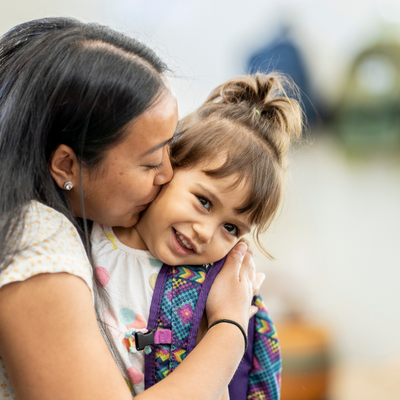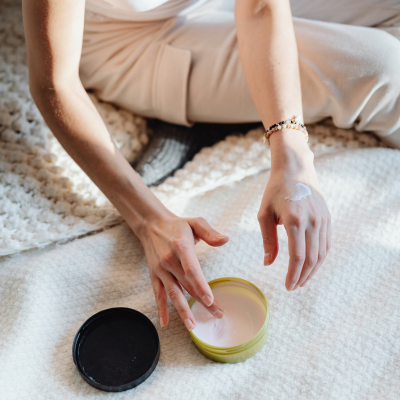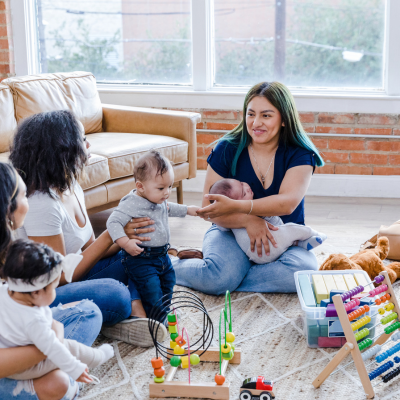Why is daycare and school drop-off so hard!?
Picture this: it’s Wednesday morning, you’re on your way to drop your two small children off at daycare, and you’re almost running late. It’s not even 8:30 a.m. yet and already you’ve been putting out small fires.
Your kids’ lunches aren’t perfect, but they’re packed. Your youngest had a meltdown over breakfast. Now your baby is crying in the car and you’re crossing your fingers for no red lights so you can get them out the door on time.
But then when you get there, drop-off time often comes accompanied with tears, separation anxiety, and your child refusing to leave your side. Needless to say, this is not the best way to start a day. You feel anxious and stressed. Your child feels anxious and stressed. How can you make this easier?

This probably feels a bit familiar, right? Many parents suffer with some level of anxiety during daycare or school drop-offs in the morning (at least some of the time anyway).
Either you’re struggling to leave your child with a teacher or childcare worker who you barely know, or your kiddo doesn’t want to say goodbye. This can be so heart-wrenching or it can cause you to worry. You may leave wondering if she’ll settle into her day, if she’s okay, and if there’s anything you should have done differently.
This doesn’t exactly set a feel-good tone for the day, does it? This is one of the most common worries voiced by mothers. Because it’s such a hot topic, I want to outline what you can actually do to make this experience better. Here, I’m including real recommendations by real mothers too!
How To Make Drop-Offs Easier For Everyone
Making drop-offs (school or daycare) easier means decreasing anxiety for everyone. Sometimes parents wonder when daycare drop-off gets easier—as in at what age—but really, kids of all ages can struggle.
For example, some very young children might adjust really easily and not struggle at all. On the other hand, an older child could have a very hard time with general anxiety or separation anxiety and not like heading into her classroom without you. This isn’t a problem that exists only in the baby and toddler years so if this is an issue for your family, know that there’s absolutely nothing wrong with that.
That said, how can you make this experience easier for them?
Creating a calm and stable environment for an anxious child is key. They are learning how to navigate situations that feel difficult for them so it’s important to do what you can to put them at ease.
As a parent, you could try to help them place their mind elsewhere. What’s something he/she is looking forward to at school today? What’s his/her favourite part of the day? Getting them excited for that is more helpful than focusing on something challenging like drop-off time. How can you reassure them? Kids who deal with things like separation anxiety might be worried that something will happen to you during the day. Reassure them that you’re safe and you’ll be seeing them in just a few short hours.
You also want to be reducing stimulation or uncertainty as much as possible so that you’re not adding to the stress. That could mean turning down the music volume in the car, taking the route with less traffic and being ready versus rushing out the door.
What moms on this community suggested:
I asked real mothers in the community how they deal with this. Here are some of the best suggestions:
- Talk about something fun you’ll do together when you pick them up
- Stick to a routine so that every day is predictable and the same
- Prepare everything the night before so there’s no rushing
- Communicate with teachers/daycare staff so that they can help if need be
- Stay confident so that they know there’s nothing to worry about
How to handle *your* anxiety during daycare drop-off:
It can be really hard to walk away during daycare or school drop-off when your child is upset. There may also be a lot of fears that you have that have nothing to do with your child’s emotions. Maybe they don’t struggle at all at this point of the day but you catch yourself fearing for their health, safety, emotional wellbeing, or you struggle with intrusive thoughts on the way to school. It can also be really hard leaving your baby or child with someone who you barely know. That’s all valid and this is why this is such a popular topic amongst mothers in the community.
One of the most effective things that you can do in this situation—for both you and your child—is to regulate yourself. When you’re calm, grounded, and focused, your child is more likely to feel the same. When you’re anxious, your child will sense that energy and start to worry themself. (No pressure, right?) The good thing about this is that it means that you have a lot of power over the situation.
So how do you start to self regulate? Take deep breaths. Even though it sounds almost too simple, this is a way to show your nervous system that you are actually safe. You cannot be anxious and calm at the same time. By taking slow, deep breaths, you’re signalling to your brain that you’re safe and there’s nothing to worry about.
You can also rely on the same things that work for your child: meditations, reducing stimulation, refocusing attention to something positive, playing calm music, being prepared early, etc. Oftentimes a simple mantra can help. (“She is happy, safe, and taken care of,” or “She’ll settle down in a few minutes. I’ll be back to pick her up before I even know it.)
Your self talk and really making an effort to be your most compassionate self will also go a long way. Start by mindfully noticing that you’re overwhelmed and just allow that feeling to come up without fighting it. From there, what can you say to yourself to reduce the pressure of that moment? (“It’s okay that this is hard for me.” “My 16-month old baby is crying, it’s only human for me to feel upset about that.”)
Finally, shift your focus to ground yourself. Soothe yourself as best as possible and ask: What’s next on my day? Where is a simple place for me to start? What am I looking forward to? That will help you stay focused and not let an emotional morning derail the rest of the day.
What other moms suggested:
I asked moms what helps them during this stressful situation. Some of my favourite recommendations are:
- Reassure yourself that yes, the drop-off is difficult but by the time you make it to the parking lot, she’s already calm and happy
- Allow yourself a few minutes to decompress in the car afterwards
- Drink coffee after drop-off to reduce anxiety beforehand
- Plan and prepare before to reduce anxiety and stress in the morning: lunches packed, bags by the door, outfits laid out
- Mantra: “We can both do hard things.”
- Act confident to signal to your child that everything is ok








Comments +